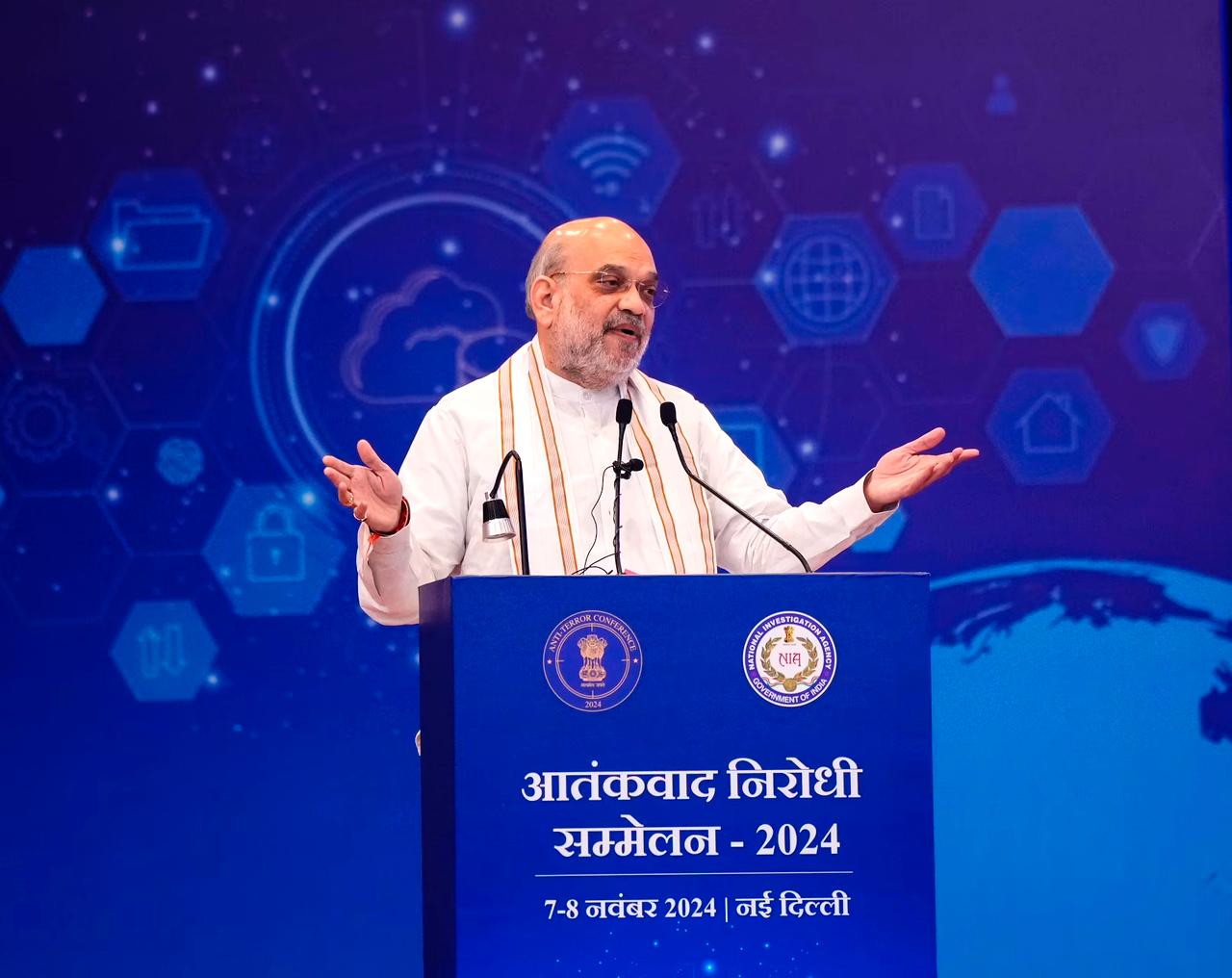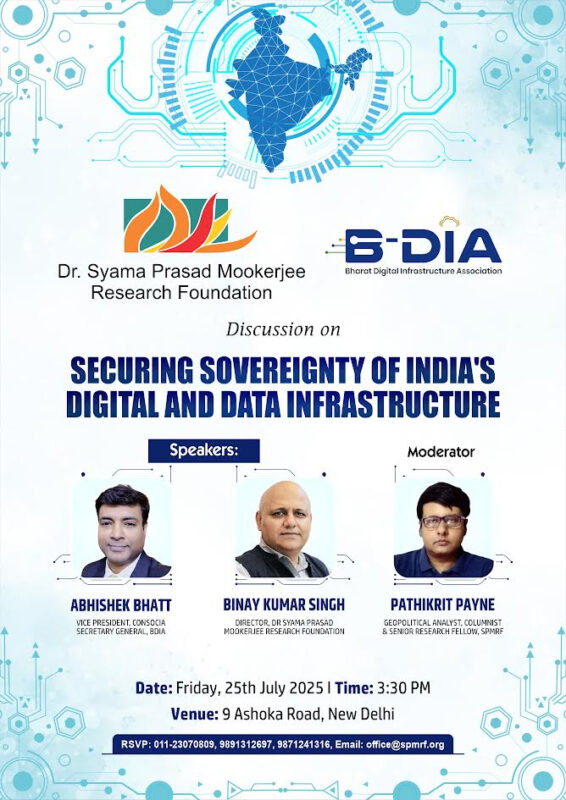In a significant move toward strengthening India’s anti-terror framework, the National Investigation Agency (NIA) on 8th November, 2024 held a two-day Anti-Terror Conference in New Delhi, bringing together central and state agencies, law enforcement officials, and government representatives to deliberate on a unified and standardised strategy to tackle terrorism. As terrorism evolves, the increasing sophistication of cybercrime and financial terrorism necessitates a broader approach to counter these threats, a theme emphasised throughout the conference.
With a clear focus on collaborative efforts, the conference sought to build consensus on a “Whole of Government (WOG)” approach, advocating for a collective responsibility across central and state lines. A key highlight was the announcement of an upcoming National Counter-terrorism Policy & Strategy, which the Ministry of Home Affairs aims to implement to address terrorism holistically—focusing not only on traditional tactics but also on dismantling the entire ‘Ecosystem’ that supports terrorism.
The WOG approach means a strategy in which different branches and levels of government—such as defence, intelligence, law enforcement, finance etc. work in concert to tackle complex problems. In counterterrorism, this means that instead of isolated responses, all relevant departments align their resources, expertise, and policies to address the root causes and networks that enable terrorism.
It is a proactive stance that aims to prevent the conditions that breed terrorism, disrupt the operational networks that support it, and develop counter mechanism within communities to counter radicalisation. This strategy goes beyond mere military intervention or policing, recognising that terrorism is a multifaceted problem that requires a comprehensive and unified response from across government sectors.
Transforming Strategy: A “Duty to Share” Culture
Union Home Minister Amit Shah set the conference’s tone, advocating a shift from a “need to know” mindset to a “need to share” philosophy among agencies. In his opening address, he stressed the importance of data and intelligence sharing to build a strong counter-terrorism ecosystem. Shah underscored the significance of dismantling support structures—like terror financing networks and cryptocurrency misuse—that fuel terrorist operations, reiterating that success lies in aligning the strategies of agencies at every level, from grassroots policing to state and central command.
Highlighting the country’s commitment under the leadership of Prime Minister Narendra Modi, Shah called for a dedicated approach that positions the fight against terrorism as a national priority, urging state agencies to see this as their mission as well.
The conference put a spotlight on the roles of the Financial Intelligence Unit (FIU) and the Indian Cybercrime Coordination Centre (I4C) in managing financial and cyber crimes, highlighting the importance of a coordinated approach for effective and comprehensive responses to these issues. Given the escalating threat posed by financial terror, the FIU’s role in tracking illicit funds has become more crucial than ever.
Strengthening Capacities and Technological Empowerment
The Union Home Secretary Govind Mohan, in his concluding address, emphasised the importance of capacity building at the state level to ensure uniform efficacy in counter-terrorism efforts across India. Mohan encouraged states to send their best officers to the NIA for training, viewing it as a means to enrich their investigative expertise, which would ultimately benefit their home agencies. The NIA, with its 95.14% conviction rate, serves as a model of rigorous, technology-driven investigations. Mohan also announced plans to establish additional campuses for the National Forensic Sciences University (NFSU) and new Central Forensic Science Laboratories (CFSLs) to bolster the quality of digital evidence in terror-related cases.
Tackling Terror Through Legal Tools and Responsible Use of Technology
Amid evolving legal frameworks, participants reflected on the Unlawful Activities (Prevention) Act (UAPA) and its application as a strong, yet judicious, tool against terrorism. While the UAPA provides a robust legal pathway to counter terror, attendees emphasised that the act should be applied responsibly to preserve its legitimacy and prevent misuse.
Sessions on “Emerging Technologies” showcased both the challenges and opportunities of technology in the fight against terror. Terrorists’ growing use of social media and encrypted platforms requires a global, cohesive approach to content moderation. The attendees collectively recognised the importance of resource pooling to counter cyber and tech constraints, ensuring a sophisticated response to tech-enabled threats.
Case Studies and Collaborative Learning: Building Knowledge from Experience
The conference included discussions on high-profile case studies, notably the Rameshwaram Cafe blast, which provided a insight into practical experiences and learnings from complex terror cases. Attendees showed strong interest in understanding the nuances of these cases, analysing how technology and advanced investigative methodologies contributed to successful outcomes.
Embracing a United Front Against Terrorism
Beyond the central and state representation, the conference was attended by a diverse array of agencies, including BSF, NCB, NATGRID, FIU, NTRO, I4C, and more. The event symbolised a collective recognition that defeating terrorism requires an integrated national approach. Amit Shah unveiled the NIA’s new motto and launched a Handbook of Standard Operating Procedures (SOPs) specifically for investigations under the UA(P) Act, symbolising the agency’s dedication to creating uniform guidelines for tackling terror.
We know that the ecosystem of terrorism extends far beyond individual attacks or groups. It includes financing, recruitment, propaganda, safe havens, logistical support, and ideological propagation.
A Whole of Government approach to dismantling the entire ecosystem of terrorism represents a paradigm shift from reactive to preventive and integrated counterterrorism efforts. By mobilising all government resources, this approach seeks to cut off terrorism at its roots. As terrorist organisations continue to adapt and evolve, so too must the strategies used to combat them. This approach also provides the flexibility, depth, and strength needed to tackle terrorism as a dynamic and multi-dimensional threat.
The NIA’s Anti-Terror Conference serves as a landmark event underscoring the nation’s resolve to adopt a standardised, coordinated approach to counter-terrorism. By fostering inter-agency cooperation and technological advancements, India is taking concrete steps toward fortifying its national security framework, ensuring that the fight against terrorism is comprehensive, productive, and future-ready.
(The views expressed are the author's own and do not necessarily reflect the position of the organisation)


